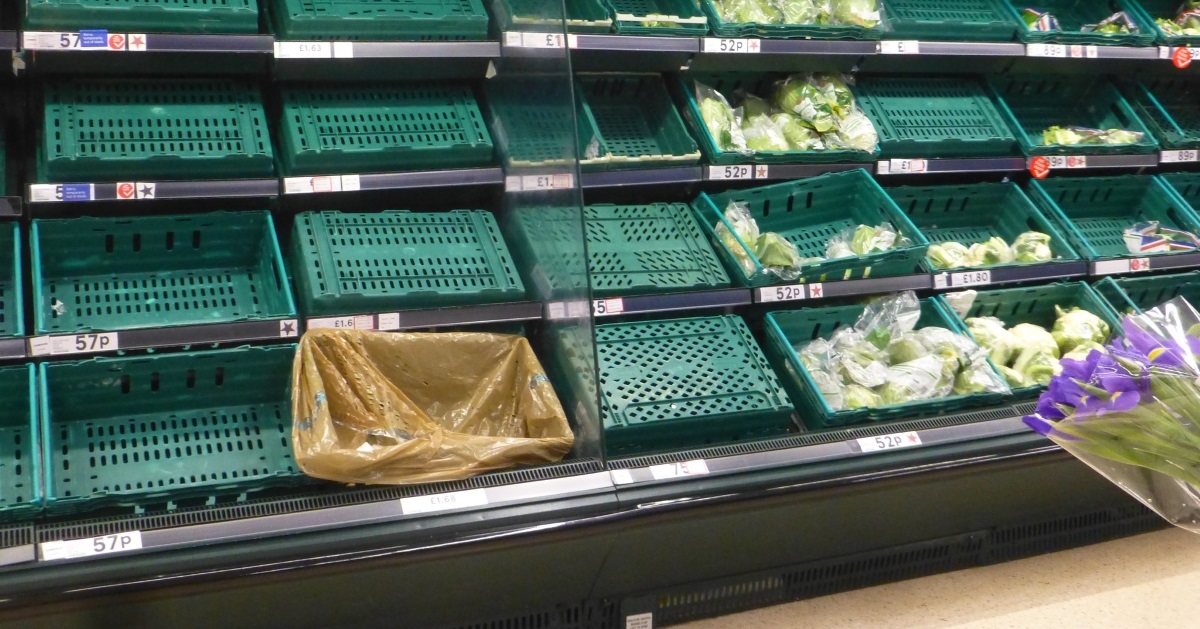Supermarkets need to examine supply chain to avoid fresh produce shortages
21/02/2023

Strawberries at Christmas? Mangoes in March? We’ve all got used to having any product, at any time of the year available in our supermarkets, ready to satisfy any food trend or surge in consumer demand.
But in the past few weeks photos have been emerging of empty shelves as food shortages have hit the fresh produce sector.
I'm sorry, @tesco this is not good enough in your Dalmarnock store on a Friday afternoon 😔 Lots more shelves with empty boxes throughout the store. Rising prices are bad enough but lack of basic foodstuffs is unacceptable. pic.twitter.com/udetX5ufUw
— Cllr Andrea Cowan (@AndreaCowanSNP) February 18, 2023
It’s not what you’d expect of a well-oiled global supply chain system that’s been operating for decades – so what’s going wrong?
With rising energy costs, climate change, labour cost increases and Brexit – there’s no shortage of challenges for today’s grocers. Add weather problems into the mix and you have the scenario we’ve seen recently with shelves empty of tomatoes.
“Consumers forget that agricultural production is always subject to weather conditions and seasonality is one of the ‘toughest nuts to crack’ in fresh produce supply chains,” says Aris Matopoulous, Professor of Supply Chain Design.
“Tomato and tomato products are the most consumed vegetables worldwide. In the UK we import tomatoes mainly from the Netherlands, Spain and Morocco. However, the high costs of electricity have affected Dutch greenhouse producers and benefited tomato-producer countries such as Morocco.”
Abhi Ghadge, Associate Professor of Supply Chain Management, says that shoppers might continue to see problems: “Fresh salad including cucumbers, cabbages and cauliflowers will all be hit by shortages in the coming weeks. But we can’t just blame Brexit. A range of issues are having an impact on supply chains. With the rising cost of heating greenhouses, and labour costs increasing, British and European farmers have scaled back on producing certain goods.”
With a seemingly perfect storm disrupting our shopping baskets, what can be done to address the problems?
Professor Matopoulos says that supermarkets need to start looking further into the future: “In the short-term, supermarkets have not got a lot of aces to pull out from their sleeves, but the in the medium to long- term they can try and balance better their supply base, reducing over reliance on specific suppliers and countries.”
Being agile and flexible in the supply chain is something Professor Ghadge also believes will help: “What supermarkets must do is think about innovative solutions. Local sourcing, and alternate suppliers are some commonly used supply chain strategies which can help manage such issues. The UK government also needs to play a part, building resilience around these recurring supply chain issues with food shortages.”
Find out more about Cranfield’s expertise and programmes in logistics, procurement and supply chain management.
Featured image by citytransportinfo on Flikr
Categories & Tags:
Leave a comment on this post:
You might also like…
Keren Tuv: My Cranfield experience studying Renewable Energy
Hello, my name is Keren, I am from London, UK, and I am studying Renewable Energy MSc. My journey to discovering Cranfield University began when I first decided to return to academia to pursue ...
3D Metal Manufacturing in space: A look into the future
David Rico Sierra, Research Fellow in Additive Manufacturing, was recently involved in an exciting project to manufacture parts using 3D printers in space. Here he reflects on his time working with Airbus in Toulouse… ...
A Legacy of Courage: From India to Britain, Three Generations Find Their Home
My story begins with my grandfather, who plucked up the courage to travel aboard at the age of 22 and start a new life in the UK. I don’t think he would have thought that ...
Cranfield to JLR: mastering mechatronics for a dream career
My name is Jerin Tom, and in 2023 I graduated from Cranfield with an MSc in Automotive Mechatronics. Originally from India, I've always been fascinated by the world of automobiles. Why Cranfield and the ...
Bringing the vision of advanced air mobility closer to reality
Experts at Cranfield University led by Professor Antonios Tsourdos, Head of the Autonomous and Cyber-Physical Systems Centre, are part of the Air Mobility Ecosystem Consortium (AMEC), which aims to demonstrate the commercial and operational ...
Using grey literature in your research: A short guide
As you research and write your thesis, you might come across, or be looking for, ‘grey literature’. This is quite simply material that is either unpublished, or published but not in a commercial form. Types ...






